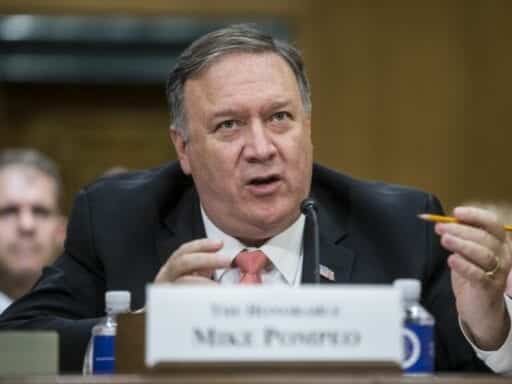Tensions between the US and Iran are already high. These attacks will likely make things worse.
Secretary of State Mike Pompeo blamed Iran for the attacks on two oil tankers in the Gulf of Oman on Thursday, an allegation that is likely to escalate tensions between Washington and Tehran.
Earlier on Thursday, two oil vessels traveling through the critical energy shipping route caught fire in what the US has now characterized as an attack.
Pompeo did not offer any specific evidence to back up the conclusion and did not take follow-up questions from journalists. But he did say that the US believes Iran was behind the attacks based on “intelligence, the weapons used, the level of expertise needed to execute the operation, recent similar Iranian attacks on shipping, and the fact that no proxy group operating in the area has the resources and proficiency to act with such a high degree of sophistication.”
The secretary of state in particular cited the attacks on four oil tankers near the Strait of Hormuz in May, which the administration also blamed on Iran. Iran has denied involvement in both those incidents and the apparent attacks on Thursday.
CNN, citing an unnamed US defense official, also reported on Thursday that crew members of a US Navy ship sent to help with rescue operations “reported that they saw an unexploded limpet mine on the side of one of the ships attacked today.”
Limpet mines, which are also believed to have been used in the tanker attacks in May, are explosive sea mines that can be attached to the hull of a ship using magnets. Iran has a substantial arsenal of sophisticated naval mines as well as a long history of using these weapons to attack oil tankers in the Strait of Hormuz and Gulf of Oman, most notably during the Iran-Iraq tanker wars in the 1980s.
“Taken as a whole,” Pompeo said, “these unprovoked attacks present a clear threat to international peace and security, a blatant assault on the freedom of navigation, and an unacceptable campaign of escalating tensions by Iran.”
Pompeo said he would instruct the acting UN ambassador to raise the issue at a United Nations Security Council meeting. “Our policy remains an economic and diplomatic effort to bring Iran back to the negotiating table at the right time,” he said.
Tensions between the US and Iran are already high. These attacks just made things worse.
Pompeo accused Iran of having targeted these vessels to make good on its threat to disrupt the oil trade in the region, specifically the Strait of Hormuz, the vital thruway for the oil trade in the region.
The secretary of state added that Iran was lashing out to get the US’s “successful maximum pressure campaign lifted.”
That “maximum pressure campaign” includes crippling economic sanctions, which the Trump administration imposed on Iran last year after the US unilaterally withdrew from the 2015 Iran nuclear deal.
Iran, along with the US’s European allies, had continued to abide by the nuclear agreement. But this May, Iran threatened to stop complying with some elements of the agreement if Europe did not do more to keep the deal alive.
Also in May, national security adviser John Bolton said the US would deploy an aircraft carrier and bomber planes to the Persian Gulf in response to “a number of troubling and escalatory indications and warnings” from Iran. The Trump administration also approved the deployment of approximately 1,500 troops to the Middle East to counter the Iranian threat.
Thursday’s alleged attacks came against this already volatile backdrop. And the administration’s decision to publicly blame Iran is not likely to make the situation any better.
The incidents also came as Japan’s prime minister, Abe Shinzo, was making a historic visit to Tehran in an attempt to defuse some of the tensions between the US and Iran. Abe, in a press conference with Iranian President Hassan Rouhani, called on “Iran to play a constructive role in strengthening peace and stability in the Middle East, so that this region won’t be destabilized further or accidental clashes won’t happen.”
Abe’s efforts were largely dismissed, both the Trump administration and Iran’s Supreme Leader Ali Khamenei, who said he didn’t believe “honest negotiations” would come from Trump.
Trump, said while he appreciated Abe’s trip, he “personally felt that it is too soon to even think about making a deal.”
While I very much appreciate P.M. Abe going to Iran to meet with Ayatollah Ali Khamenei, I personally feel that it is too soon to even think about making a deal. They are not ready, and neither are we!
— Donald J. Trump (@realDonaldTrump) June 13, 2019
Pompeo, meanwhile, said Iran had “insulted” Abe, as one of the vessels targeted in the alleged attack belonged to a Japanese shipping company.
What happens next is still unclear, but some Republicans, including Sen. Lindsey Graham (R-SC), have called on the US to impose even harsher sanctions on Iran.
Trump, back in May, told reporters that “Iran wants to fight and I certainly don’t think they want to fight with us.” But the risk is even greater now that both sides stumble into one.
Author: Jen Kirby
Read More



